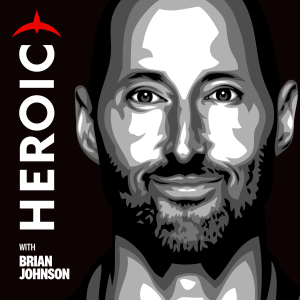
You Are Heroic with Brian Johnson
Health & Fitness:Alternative Health

In our last +1, we talked about the PM ritual Pythagoras came up with 2,500 years ago (!) that the Stoics liked to follow:
"Allow not sleep to close your wearied eyes,
Until you have reckoned up each daytime deed:
‘Where did I go wrong? What did I do? And what duty’s left undone?’
From first to last review your acts and then
Reprove yourself for wretched acts, but rejoice in those done well.”
Today we’ll step back a bit and put in an AM Intention practice to go with that PM Reflection practice.
Let’s go back to Donald Robertson’s How to Think Like a Roman Emperor.
He encourages us to follow another one of Aurelius’s practices and “Contemplate the Sage.” Specifically, he tells us that Marcus made it a practice to think about the virtues he admired in others that he aspired to put into practice in his own life.
He also tells us: “In addition to the virtues of real people, the Stoics were also known for contemplating the hypothetical character of an ideal Sage, or wise person.”
Then he shares my favorite practice: “In addition to asking ourselves what qualities the ideal wise person might have, we can ask what qualities we might hope to possess in the distant future. For instance, what sort of person would you hope to be after having trained in Stoicism for ten or twenty years?”
When I read that I immediately thought of our Carpe Diem journaling process.
In our Mastery Series, after establishing the ultimate game we’re playing (and how to play it well), we walk you through a Steven Covey-inspired eulogy exercise in which you attend your own funeral and listen to what your loved ones have to say about you.
Pause for a moment, if you feel so inspired, and imagine that scene. You’re gone. It’s your funeral. Who says what?
Specifically, what VIRTUES do you hope people use to describe you and your presence in their lives? WRITE THOSE DOWN.
We then proceed to help you get more clarity on who you are at your Optimus-best so that you can more consistently express those virtues TODAY.
We need to move out of the abstract, “Oh, yah. That’s how I’d like to be remembered” to a VERY concrete, “Well, if I *really* think those qualities are important, then TODAY is the day to live in integrity with them.” (Right?)
Which leads us right into the next piece of wisdom Donald shares which also happens to map over nearly perfectly with what we encourage our Optimizers to do.
He tells us to reflect on your ideal self and those virtues you intend to embody every morning. Write them down. Imagine your ideal self interacting with people Today. Who are you? How do you show up? That’s essentially what Aurelius did.
We call our Optimize process “Carpe Diem Journaling.” We start by getting clarity on our Optimus-best selves in our Big 3 of Energy + Work + Love. Then we briefly reflect on that best-self Identity and write down the virtues that version of you embodies. Then we identify the #1 behavior we’ll engage in that day as we re-commit to being that version of ourselves TODAY.
Donald encourages us to add a PM reflection so we can go through what he calls daily “learning cycles.” At the end of each day, he tells us to ask ourselves three simple questions:
What did you do badly? What did you do well? What could you do differently? Those three questions happen to be exactly the questions Lanny Bassham tells us to reflect on after a performance. Only, he switches #1 and #2—starting with the positive.
Shall we start that reflection process Today?
How about RIGHT NOW?
If you feel so inspired, reflect on those three questions for your day so far today:
Fantastic.
Imagine your life in ten to twenty years if the ONLY thing you changed was adding that simple reflection practice into your life.
Here’s to aggregating and compounding those incremental gains over an extended period of time so that BEST version of us is the one looking back at us in the mirror in ten or twenty years.
More Episodes
012345678910111213141516171819
Create your
podcast in
minutes
- Full-featured podcast site
- Unlimited storage and bandwidth
- Comprehensive podcast stats
- Distribute to Apple Podcasts, Spotify, and more
- Make money with your podcast
It is Free
- Privacy Policy
- Cookie Policy
- Terms of Use
- Consent Preferences
- Copyright © 2015-2024 Podbean.com




